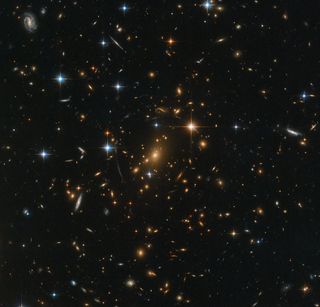Gigantic Galaxy Clusters Sing a Spooky Song into the Cosmos
Galaxy clusters are some of the most massive structures found in the universe — and apparently they sound pretty spooky, too.
NASA's Hubble Space Telescope captured a stunning new view of the spiral arms and elliptical structures of thousands of galaxies all nestled together. Researchers from the science-art outreach program System Sounds then converted this Hubble data into eerie recordings, demonstrating the various musical tones that galaxies sing, according to a statement from NASA.
"Compact galaxies and a few foreground stars create brief tones, while elongated spiral galaxies produce longer notes that can change pitch," according to System Sounds.
Related: Hubble in Pictures: Astronomers' Top Picks

The galaxy cluster in question, known as RXC J0142.9+4438, contains thousands of galaxies held together by gravity. In addition, each galaxy is home to countless stars — some of which shine brightly in the foreground of the Hubble image.
The largest grouping of galaxies lies near the center of the image and produces sound in the midfrequency range, which can be heard about halfway through the video.
Conversely, objects captured near the bottom of the image produce lower notes, and those near the top produce higher notes, according to the statement.
Get the Space.com Newsletter
Breaking space news, the latest updates on rocket launches, skywatching events and more!
The photo was taken Aug. 13, 2018, using Hubble's Advanced Camera for Surveys and Wide Field Camera 3. When a massive object, such as a galaxy cluster, falls between an observer (like the Hubble telescope) and a more distant target in the background, the intervening object creates a so-called gravitational lens that magnifies the observer's view.
This Hubble image was captured as part of an observing program called RELICS (Reionization Lensing Cluster Survey). Galaxies identified through the program will be studied in greater detail by the James Webb Space Telescope, which is expected to launch in March 2021.
- Most Amazing Hubble Space Telescope Discoveries
- How the Hubble Space Telescope Works (Infographic)
- How to Tune a Star System: Alien World Complicates Harmony of Multiplanet System
Follow Samantha Mathewson @Sam_Ashley13. Follow us on Twitter @Spacedotcom and on Facebook.
Join our Space Forums to keep talking space on the latest missions, night sky and more! And if you have a news tip, correction or comment, let us know at: community@space.com.

Samantha Mathewson joined Space.com as an intern in the summer of 2016. She received a B.A. in Journalism and Environmental Science at the University of New Haven, in Connecticut. Previously, her work has been published in Nature World News. When not writing or reading about science, Samantha enjoys traveling to new places and taking photos! You can follow her on Twitter @Sam_Ashley13.